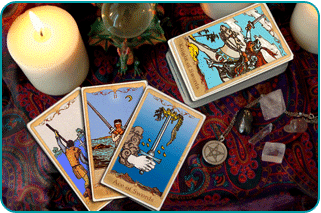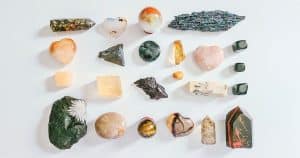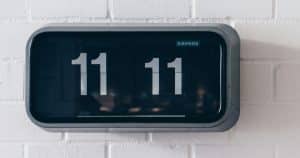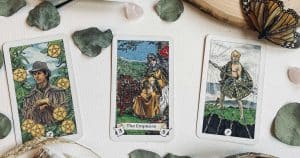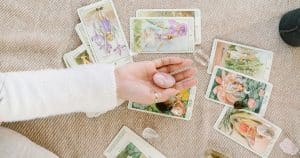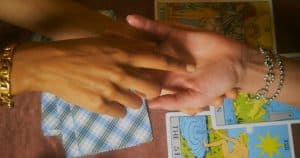The Tarot Suit of Swords
Have you ever felt caught between logic and intuition, reason and emotion? In the world of tarot, one suit masterfully captures this eternal struggle – the Suit of Swords.
As tarot enthusiasts know, the suit of swords represents the element of air, ruling over the realm of the mind with its sharp edge of clarity and truth, often bringing new perspectives. This connection to air isn’t just symbolic – it’s essential to understanding the suit’s power.
While other tarot suits govern different aspects of human experience – Pentacles (material), Cups (emotions), and Wands (creativity) – swords in tarot cut straight to our mental clarity and thought patterns. This powerful collection of 14 cards from the tarot deck reveals how we think and communicate through processes as invisible yet vital as the air we breathe.
Think of swords as double-sided tools. Just as a sword can both protect and harm, our thoughts can illuminate or deceive. When you see a swords card in your reading, it signals a time when your mental realm takes precedence. Your intellect, rather than your heart or practical concerns, should guide your path.
Swords are often associated with challenge and growth. They remind us that the mind’s journey isn’t always comfortable – but it’s always enlightening. Through periods of overthinking and indecision, these cards offer guidance toward clarity and truth.
The Air Element in the Suit of Swords
The element of air shapes every aspect of the Swords suit, infusing these cards with qualities that mirror the invisible yet powerful force of wind itself. Like air, the mental realm can be both refreshing and turbulent, bringing either clarity or chaos to our thoughts.
Understanding this elemental connection helps demystify deeper sword tarot card meanings. Here’s how the qualities of air manifest in this powerful suit:
- Intellectual Clarity: Like a fresh breeze clearing storm clouds, Swords bring mental sharpness and logical thinking
- • Communication: Just as air carries sound, Swords govern all forms of expression and exchange
- • Movement: Air never stays still – Swords often indicate rapid thought progression and mental transformations
- • Power: Like wind, thoughts can be gentle whispers or devastating forces • Invisibility: Though we can’t see air or thoughts, we feel their effects powerfully
When swords appear in your reading, pay attention to how these airy qualities might be influencing your situation. Are your thoughts as clear as a bright sky, or turbulent like a storm? The suit of swords is associated with this constant movement between mental clarity and confusion, urging us to find balance in our intellectual pursuits.
Common Symbols in the Suit of Swords
The imagery in the suit of swords tarot card tells powerful stories through consistent symbols. Each card weaves these elements together to create meanings as double-edged as the blades they feature.
Look for these recurring symbols in your readings:
- Clouds and Sky: Often depicted against turbulent skies or breaking storm clouds, reflecting the mental realm of air and thought.
- Swords Crossing: When blades intersect, they suggest conflict or difficult situations requiring careful navigation.
- Blindfolds: Representing self-imposed limitations or willing ignorance, particularly in the Two and Eight of Swords.
- Mountains: Standing for challenges to overcome and peaks of understanding to reach.
- Birds: As creatures of the air element, they symbolize messages and mental freedom.
True tarot enthusiasts know that these symbols work together to create deeper meaning. A sword card might show a figure standing beneath dark clouds, but notice how nearby birds can also suggest hope and transcendence. Even in cards that seem challenging, like when the ten of swords comes into play, these symbols offer guidance about how to improve your situation.
Remember: every symbol carries both shadow and light. Just as a sword’s sharp edge can both cut and clarify, each image invites us to examine our thoughts from multiple angles.
Ace of Swords
The Ace of Swords might be better illustrated with the conventional cartoon of a light bulb over one’s head. Clear thought and precise comprehension are indicated here. Logic at its sharpest is this card.
Two of Swords
The Two of Swords is the card that appears when you know the truth, but are in denial about it. The crossed swords in this illustration represent cross-purposes and the blindfold represents avoidance.
Three of Swords
The Three of Swords might appear to be about heartbreak and emotion. It is actually an indicator of understanding that something is lost forever. Be it a breakup or a death, comprehending loss is part of any process.
Four of Swords
The Four of Swords appears to be a bit stiff, but the lively process of contemplation is as active on the inside as it appears peaceful on the outside.
Five of Swords
Many people think about what they should get before considering anyone else. If the Five of Swords appears in your reading, this thought process might be afflicting you. Not thinking you are selfish is a hallmark of selfish people.
Six of Swords
After the state of mourning there is the mental process of getting back on with things. The Six of Swords illustrates how rumination can occur while you are trying to move on. No matter how sad your story, standing still for too long is never a good narrative.
Seven of Swords
If you have a good reason to take the easy way out, the Seven of Swords will only reinforce your mental gymnastics. This is the card of rationalizations. We all do this; it is fundamentally human to rationalize our actions. Limiting them in our lives and their impact among others is what is important.
Eight of Swords
The Eight of Swords reminds us that being stubborn has its rewards, especially if you like being bound close to the world you have chose. It is great if you like being blind to possibilities that life has to offer outside of the sphere of your limited experiences.
Nine of Swords
The Nine of Swords illustrates the night terrors of those who feel guilty, and who see the situation as hopeless. When there is no turning back from the wrong direction, the Nine of Swords marks this realization.
Ten of Swords
As grimly illustrated in the Ten of Swords, many martyrs have paid the ultimate price. Most, however, just complain about their situation as the convenience of blaming others assists in deflecting attention away.
Page of Swords
When your thinking is immature, or when your communication is vulgar, unclear and self-absorbed, the Page of Swords appears to point out how much growth must be ahead.
Knight of Swords
The Knight of Swords indicates some rapidly developing idea, or communication with a transformative lesson.
Queen of Swords
Your polite conversation is something everyone has come to rely on as a stabilizing force. The Queen of Swords points out you might even be nice as a way to stay in control.
King of Swords
You are so right. The King of Swords indicates your ideas are shown to be in accordance with the way the world works. Someone else might even acknowledge this.
In conclusion, the presence of Swords might mean the absence of passion and pleasure in your life as you have much thinking, sorting and communication to take care of. But the process of analysis can be as fun and rewarding as any other part of life, so enjoy holding your sword high.
